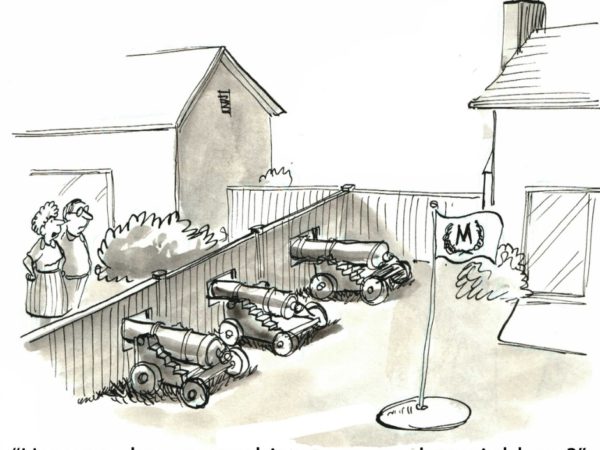To be worthy of the task of governing a monastery, the abbot must always remember what his title signifies and act as a superior should (Rule of St. Benedict, 2.1).
The father and mother must also remember what their titles signify. Today this seems to require a vocabulary review, even for native speakers. Never in the history of tautology has such a frisson of excitement run through the announcement that a father is a man, and a mother is a woman. Who knew that it would become controversial to read a dictionary out loud ?
A man who begets a child has the responsibility to act as a father to his child. A woman who conceives a child has the responsibility to act as a mother to her child. Father and mother should be married to each other. The sacrament of matrimony is a sign of the relationship between Christ and the Church. The husband represents Christ, and the wife represents the Church (Mark 10:6-9; Catechism of the Catholic Church Part II, Chapter 3, Article 7: “The Sacrament of Matrimony.”)
For two thousand years the Church never had to defend the essential maleness and femaleness of humanity. The Church has, however had lots of experience standing for the essential humanity of human beings. It’s clear that a Christian understanding of the human being includes a dynamic between male and female. The harmony of masculinity with maleness and femininity with femaleness has always been obvious to everyone in all cultures, notwithstanding the variations peculiar to time and place.
From the earliest days of the Church, men and women have always been called to develop the same spiritual qualites. St. Paul lists these explicitly: love, joy, peace, patience, kindness, generosity, faithfulness, gentleness and self-control (Galatians 5:22-23). This is not an exhaustive list. There are other qualities such as courage and truthfulness that the Holy Spirit cultivates in those who belong to him.
Both the father and the mother in a household are called to imitate Christ. Far from flattening their respective personalities or erasing their sexual differences, the Holy Spirit will fulfill and develop them, both as man and woman and as specific individuals with unique characteristics. (Two authors who write eloquently on the individuation of Christians are G.K.Chesterton in Orthodoxy and C.S.Lewis in The Screwtape Letters). One of the most important Christian themes is that you fulfill yourself not by focusing on your own personality but by focusing on Christ’s personality. It’s from within this tradition that I am writing, and so most of what I say will be for parents as parents relating to children as children, without a lot of gender-specific commentary.
On the other hand, I’m not sold on gender-inclusive language. Having studied a few other languages, it strikes me that only English speakers take personal pronouns so personally. I don’t have a problem accepting “he” as representing human beings in general. The whole point of a pronoun is to save you the trouble of listing out everyone you’re referring to.
Representation is essential to Christianity, never mind democracy. The Apostle John tells us that Christ is the Word of God, and he emphasizes the creative acts of Christ, the Verb. But as redeemer of the world Christ also becomes the Pronoun. He is the atoning sacrifice who stands in for us before a holy God. If you reject the power of “him” to represent you, don’t you reject the whole concept of redemption as well?
But, since it’s impossible not to feel awkward in the third-person singular these days, I’ve decided just to collar the reader and address him or her as you, whoever you are. I also refer to us, meaning we-the-people-who-are-still-making-an-effort. My goal is to write succinctly, correctly and honestly. If I write badly, I risk confusing you. If I get something wrong, I risk misleading you.
But if I say nothing at all, I risk offending the Master who reproached only the servant who refused to try (Matthew 25:14-30.) I’ll do the best I can with the resources I’ve got. Others are more than welcome to pitch in. And in fact it’s necessary for each one to make an effort here. Why would you yield your God-given sexuality to an atheist culture? Be a man. Be a woman. Your choices will contribute to defining the terms.




